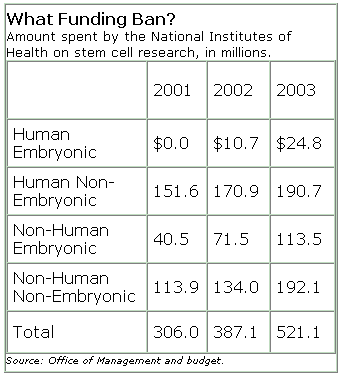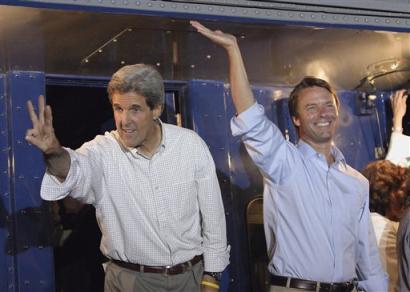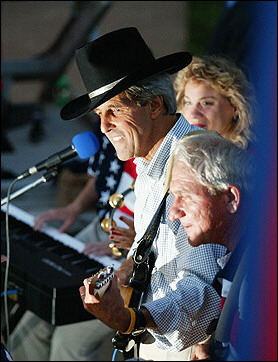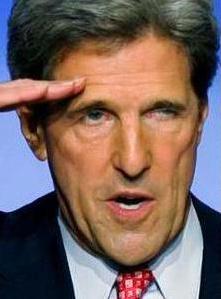Here in New York (although I should probably start saying "the Greater New York City metropolitan area"), there's obviously been a lot of talk about recent terror warnings concerning financial targets.
What wasn't so obvious to me is the level of taunting this would inspire amongst some of my Democratic friends. By lunchtime Monday morning, I'd heard no less than three different variations on the following theme (always with the same smug shit-eating grin): "So, tell me again why Chimpy has made us safer? Hmm? Wanna explain me that one again? So much for our big 'wartime' crotch-stuffin' flightsuit hero, hmm?"
Then there are the predictable accusations that the whole alert is nothing more than an election year publicity stunt, to steal the spotlight away from the Democrats. Why the threat level was elevated after the Democratic Convention, however, is not explained.
In fact, given some recent post-convention polling numbers I've seen, the Democrats should be thankful as few people paid attention as did.
But the timing doesn't really matter in the end, does it? Any significant announcement that occurs anytime between now and November, be it a high-profile capture or killing (good news) or an elevated threat level (bad news), will be tarred with the same brush: cynical and crassly partisan political manipulation by the Rove machine.
Of course there's no way the Bush crowd can win with these people. Should they announce a terror warning? If they do, they're fearmongering to rig the election. If they don't, and, God forbid, something happens, they're "asleep at the wheel", or have failed to "connect the dots".
But it begs the question, why do these people feel the need to come to me with their grousing? Granted, I'm probably the closest thing many of them know to a Bush supporter, lukewarm though my support may be. For whatever reason, they see the current threat level as indicative of a systematic failure of Bush policy, and they see Kerry as the obvious beneficiary of said failure. Chimpy has not "kept us safe", so let's bring in Captain Botox and his Swiftboat Buddies to save the day.
There's a problem with this reasoning, however, and it's ironic that I'm forced to explain it to the party of "nuance," but here goes:
We never claimed to be "safe." Pace Wesley Clarke, no one can guarantee to keep us safe, be it Bush, Kerry, or any other candidate for the job. If you believe that Kerry will make us safer than Bush, then by all means, vote for him.
You must understand, however, that there are still many of us who, whatever our misgivings about Bush, harbor very real concerns about Kerry's leadership during a time of war.
Among other things, we are concerned that
-
Kerry would be too deferential to the UNSC to fight effectively in America's best interest.
- Kerry places a higher premium on being liked by France than being feared by Muslim extremists.
- Kerry would strike an essentially defensive posture in the War on Terror (from his speech at tht Democratic Convention): "Any attack will be met with a swift and certain response." That doesn't exactly put us on the offensive. Hell, he even phrased the sentence in passive voice.
- Kerry would be too cautious in acting militarily to defend our interests. (Again, from his speech): "You will never be asked to fight a war without a plan to win the peace." That pretty much rules out every war we've ever fought, doesn't it? What was the "plan for peace" when we entered WWII, for example? He also said, "And as President, I will bring back this nation's time-honored tradition: the United States of America never goes to war because we want to, we only go to war because we have to." I wonder then how he justified his votes in support of Bosnia, then? Or Kosovo? Or Somalia? Or, for that matter, Iraq?
I've said it for a long, long time, but I'll say it again: Bush is vulnerable. His one remaining ace is that, despite his unpopularity, many people still feel more comfortable with him at the helm of our terror policy than Kerry. Kerry had a chance to overcome Bush's advantage during his convention speech. He failed.






